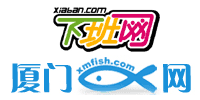 Note: This post is part of an extended auto-biography which is collected in my About page.
Note: This post is part of an extended auto-biography which is collected in my About page.
After leaving my role as head of the recently acquired Rotten Tomatoes and a VP at the even more recently acquired IGN Entertainment, I rejoined my frequent business partner Patrick Lee in the Chinese coastal city of Xiamen, Fujian province, where he had teamed up with his original business partner from his first company, Jimmy Zhuang (庄振宁). Jimmy, a college classmate of ours, was originally born and raised in Xiamen prior to moving to California for high school and, eventually, university at Cal.
Our initial web site in China, Xiaban.com (下班网), was initially a customer loyalty platform for merchants whereby customers could swipe a loyalty card at hundreds of different participating stores and receive points which could be redeemed for prizes and discounts. Merchants could sign up to receive powerful, aggregated data about their customers including demographic data, spendings statistics, and comparison data with their competitors. Furthermore, we provided a way for merchants to target SMS-based ads to their customers — every time the card was swiped, the customer would receive an SMS confirming their points along with an advertising area for merchants that could be targeted by neighborhood, customer demographic, or store category. We rolled out this powerful platform across nearly a thousand stores throughout our Xiamen with plans to expand nationwide. When I came into the company as Chief Operating Officer (COO), I was additional tasked with redoing Xiaban.com as a Yelp-like web site that would help us rapidly expand our brand throughout China. Like Yelp, our site allowed users to find the best places to eat and shop from a comprehensive, nationwide database of merchants and share their reviews and tips with other consumers and friends. We further tied in these member services with data accumulated by using the Xiaban loyalty card so members could check and redeem points and prizes online. Unfortunately, the site’s traffic was leapfrogged by our rapidly growing competitor, Dianping.com, and at the end of 2006 we decided to pivot away from the capital-intensive loyalty card platform. Instead, we acquired XMFish.com (厦门小鱼社区), a rapidly growing local community web site in Xiamen. XMFish.com’s traffic was on a phenomenal growth path in the local Xiamen area and was already becoming the most important online destination in Xiamen. As part of the new company, we grew XMFish to become the most trafficked website in the province and a vital and positive community in the Xiamen area. By building online ad sales on the site, we were able to grow both the web site and company stably.
At the current time, XMFish.com has expanded to included neighboring cities and has even begun offering our loyalty card again in partnership with local banks including ICBC. The site has become the primary online platform for local advertising and has been extended to include services like group buying and an online shopping of local merchants with same-day delivery.
While I departed from my full-time position in December 2006, I continue to frequently return to Xiamen.


